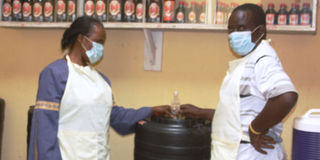Making banana wine to avoid incurring losses

The Munyarwandas show their packaged wines.
During the peak season of bananas, many farmers incur losses because they are paid low prices yet there are little known technologies in Uganda to preserve the ripe ones.
Many farmers do not have facilities where they can store their produce as they wait for the prices to rise. However, Eunice Munyarwanda, a banana grower in Rwankenzi village, Kasenda Sub-county in Kabarole District has found a solution.
After suffering losses for a long time, Munyarwanda thought of how to add value to her bananas, not only to minimise losses but to increase her earnings.
“During high supply of bananas, I would be paid Shs8,000 which is little given the high cost of growing bananas,” she says.
She now owns 20 acres of bananas having started in 2012 with support from Kabarole Research and Resource Centre (KRC), that provided her with training in banana wine making.
Starting out
The 43-year-old says she invested Shs370,000 to start her enterprise. The money was used to buy saucepans, airlocks, bucket, bottles, jerry cans, additives such as wine yeast, citric and honey. With everything set, Munyarwanda utilised a room at her house and set out on her quest to make “Jovence wine”. She derived the name from her daughter Novent Maziwa.
“I started this project for my children. When my daughter is done with university, I want her to take over the business and that is why I named the wine after my first born, Munyarwanda shares.
For the start, she made 120 bottles. This fetched her Shs1.2m where she made a profit of Shs800,000.
Realising the potential of her new found business, Munyarwanda persisted.
She says that she supplies her wine to supermarkets within Kabarole, Kasese, Bundibugyo, Kamwenge, Kyenjojo and other urban areas. However, she does direct sales to individuals who go to her home. She sells a big bottle at Shs10,000, that is factory price and a small one at Shs2,000.
However, she says the market is still small because she only sells in Rwenzori region. In a month, she earns about Shs3.6 million from her enterprise, but Munyarwanda makes more money during the festive season.
Ripple effects
Munyarwanda has been able to earn both in selling raw bananas as well as the byproduct without incurring losses and has been able to educate her children and buy prpoerty.
She has been able to run other businesses and make wine in her free time.
To save on on labour costs, she works with her family.
Challenges
However, she meets some hurdles such as preservatives that are bought from Kampala which is expensive and time consuming.
She says obtaining UNBS accreditation is hard because it’s a long process and when you are not accredited; your product has limited market.
Munyarwanda says on the whole she is happy that she turned to banana wine because it is more rewarding and has a longer lifespan.
Lessons
“I have learnt that with little capital, you can start a project and it grows with time,” she says.
The wine project does not need a lot of time, and you can do it in your free time. “I have learnt that when you add value to something like bananas you earn more,” Munyarwanda says.
How to make banana wine
Step 1: Munyarwanda says it takes one week for bananas to ripen.
Step 2: Peel the ripe bananas and put them in a saucepan, put water and boil until it reaches a boiling point.
Step 3: When it has boiled, remove it from fire and put them in a sack and hang them in a room. Put a bucket down where juice will be collected as it drains.
Step 4: Leave the juice for three days to cool down.
Step 5: Pour it in a tank and then add citric acid and wine yeast. Cover it and put an air lock on top.
Step 6: After one month, sieve it and put it in another tank. Sieve it again after two months and again after six months.
Step 7: Thereafter, add honey and serve or bottle. However, Munyarwanda advises that the best banana wine is that which has stayed for more than a year.
Preserving bananas
Freeze
Bananas can be frozen, either whole or sliced, to be used later. To prevent browning at thawing time, brush them with lemon or lime juice. Once defrosted, bananas may be too mushy to eat normally, so they are better used in recipes, smoothies and pies.
Banana flour
Banana flour is a powder traditionally made of green bananas. Historically, banana flour has been used in Africa and Jamaica as a cheaper alternative to wheat flour.
Banana bread
Banana bread is a type of bread made from mashed bananas. It is often a moist, sweet, cake-like quick bread.
Crisps
Banana chips are deep-fried or dried slices of bananas. They can be covered with sugar or honey and have a sweet taste, or they can be fried in oil and spices and have a salty or spicy taste.
Did you know?
Bananas are good for your heart. They are packed with potassium, a mineral electrolyte that keeps electricity flowing throughout your body, which is required to keep your heart beating. Bananas’ high potassium and low sodium content may also help protect your cardiovascular system against high blood pressure.




